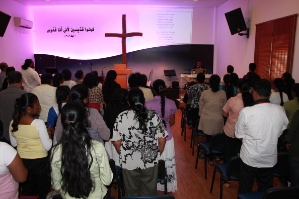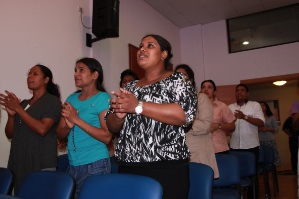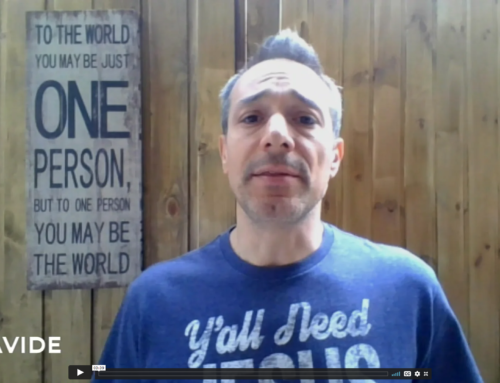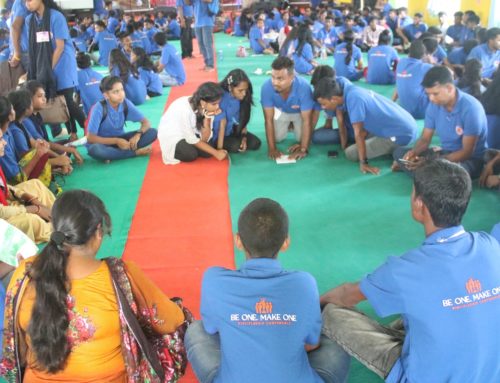 Equipped with a new vision and sense of unity, the three Nazarene churches in Beirut, Lebanon, are working together in a shared mission that has resulted in the planting of four new churches in the past year.
Equipped with a new vision and sense of unity, the three Nazarene churches in Beirut, Lebanon, are working together in a shared mission that has resulted in the planting of four new churches in the past year.
The three churches in Lebanon, which the denomination first officially entered in 1950, have persevered through decades of civil war and political instability. In addition, they suffered from disunity in recent years.
At the same time, some of the leaders attended events that dealt with the theme of being missional and reaching out. These repeated messages about being a missional church sparked in the Lebanon leadership a new thinking about their purpose.
In 2010, the leaders of the Nazarene Church in Lebanon met to pray together for unity and harmony, and to seek a vision for the next five and 10 years.
“We are so glad that we have strong Manual in the Church that helped us,” said Rev. Ayman Kafrouny, pastor of the Bouchrieh Church of the Nazarene. “Because we followed the Manual, we discovered it is really done in a good way that can protect the church…. This helped us to build a good relationship with each other and it ended up now we have a very good and strong relationship with each other as leaders of the three churches.”
After much prayer, the pastors and district superintendent, Rev. Andrew Salameh, felt led to set a goal to plant six new churches by the year 2015, and to have a total of 20 Nazarene churches in Lebanon by 2020, according Salameh.
The group continued seeking God’s will by meeting for prayer every three months and holding two leaders’ retreats.
“Things started happening and God started answering our prayers,” Salameh said. “So we started to believe this can and may happen because for a long time everything was going very slow. There is a wonderful spirit of unity in the pastors and leaders. We are moving in one direction toward the vision and goals.”
In the past year, people from various ethnic groups began to approach the churches about starting works among their immigrant communities. As a result, there are now four church plants among four different ethnic groups.

Starting with just two women, a congregation of about 60 Sri Lankan people now meets every Sunday afternoon for worship and fellowship at the Bouchrieh Church of the Nazarene. A pastor and his wife who speak both the main languages of Sri Lanka – Singhalese and Tamil – came from Sri Lanka to Lebanon specifically to lead this new church group. Next month they will conduct a membership class and baptize 15 to 20 believers.
Kurds
For the past year, a Kurdish congregation has been meeting to worship in their own language at the Sin el-Fil Church of the Nazarene. The group had grown to about 100, but their leader left and it is now averaging about 15 people. The plan is to relaunch this work in the coming weeks.
Africans
An African pastor knew a man whose son was attending the Nazarene Evangelical School in the Sin el-Fil neighborhood of Beirut. That man connected the African pastor with the district. The pastor was shepherding a group of immigrants from Malawi, Ethiopia and Nigeria who speak English. After examining the Nazarene Manual and doctrinal beliefs, the pastor decided to join his congregation with the Nazarene denomination. There are about 20 people meeting in this group in an apartment they rent from their own funds.
Indians
A congregation of about 15 immigrants from India are meeting for worship at the Bouchrieh Church of the Nazarene.
Salameh said he expects to officially organize at least two of the churches by the end of 2014.
The three original Lebanese churches are actively involved in helping the Syrian refugee community in Beirut, and so it is possible they could plant a fifth church among this population, he added. In addition, a family in the Bouchrieh church has led several people to Christ in their home village and started a home group that meets there twice a month.
Kafrouny said the vision they are pursuing comes from God, not themselves, but that they continue to be open to every new opportunity for ministry.
“Churches are starting, new members are coming to the church, new doors are open to start new groups or new churches — these are signs from the Lord we are working according to his will,” he said.
Salameh said a reality for the Lebanese leadership is that they will need to find 20 new pastors or leaders if they are going to have 20 churches in the next seven years. So the leaders are praying that God will raise up more leaders and workers to keep up with the growth God is bringing.



